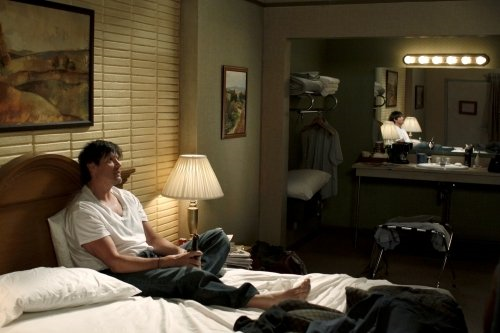Ayn Rand’s Atlas Shrugged isn’t a work with universal appeal, but it interests me as a work of propaganda. It is a powerful text, and one that has had an enduring influence on Western politics. While my disdain for Objectivism and the sanity of most of its adherents is pretty well documented, I do, at least to an extent, get the appeal.
There are some things that were inevitably going to be bad about the recent movie adaptation Atlas Shrugged: Part I, the first in a trilogy: the utopian pseudo-philosophy at its core; unlovable heroes and pantomime villains; the absurdity of a mysterious stranger going about making zillionaires offers they can’t refuse to leave it all behind, and so on. This is all the usual stuff of Atlas Shrugged criticism and while fair enough, it’s not really pertinent to criticism of the movie, because the movie couldn’t have been made authentically without it. (The question of whether it should have been made authentically at all is another one; I think it should.) So this review isn’t a critique of the novel, or Rand’s philosophy; it’s a critique of the film.
There’s a scene early on in the story where Paul Larkin, a business-courtier of sorts, counsels Hank Rearden about the importance of public opinion. The movie plays it pretty straight and is much shorter than the novel text, so the dialogue is transcribed here:
Larkin: You’re not very popular, Hank.
Rearden: I haven’t had any complaints from my customers.
Larkin: That’s not what I mean. You know what you should do? You ought to get yourself a good press agent, to sell you to the public.
Rearden: It’s my metal I’m selling, not me.
Larkin: But you don’t want the public against you. Public opinion can mean a lot.
Rearden: As far as I can tell it doesn’t mean a damned thing one way or another.
Larkin: The press is against you.
Rearden: They have time to waste. I don’t.
This theme — to hell with what the peasants think, only quality matters — it central to Rand’s work, and the filmmakers here have taken it entirely to heart. They have made a film that is almost incomprehensible to those who aren’t familiar with Rand’s text, presumably on the premise that anyone who matters will know the story already, or will be able to divine the work’s innate and self-evident quality for themselves.* The result is a simplistic, primary retelling of Atlas Shrugged: a film without cinematic appeal or narrative cohesion, and that doesn’t effectively convey Rand’s milieu, her ideas, or her ideology, and consequentially fails to live up to her vision.
The first and most immediately evident failure is that the film is talky to a fault. Before it was released I expressed concerns that a production team of Objectivist True Believers would lack the necessary courage to take the red pen to the hallowed text. This fear has been fully borne out. What works on the page — and what worked on the page in the 1950s — does not always work on-screen. The iron law of the moving picture is show me, don’t tell me, and it is not unfaithful to cut an author’s prose to suit the needs of a new medium. Yet it seems every cut, every edit (and of course there are many; it’s a long book) has been made reluctantly.
Seriously: as Hank and Dagny retire to their rooms after celebrating the John Galt Line’s maiden run, we don’t need Hank to confide in a stage-whisper to Dagny that he wants to kiss her, or for her to say “what’s stopping you?”. Earlier, after about 40 minutes of wondering when the hell the movie is going to start, we got a brief conversation about dessert, banana or chocolate? In other cases Rand’s phraseology intrudes: the introduction of John Galt — the first meaningful piece of dialogue in the film — comes almost verbatim from the novel: he introduces himself as “someone who knows what it’s like to work for himself, and not let others feed off the profits of his energy”. Come again? Rand’s hackneyed ideological tropes (“Anti Dog Eat Dog Act” &c) are retained without the benefit of the novel’s context, in which they make sense. The screenplay manages to fail both the tasks of good exposition: convey a vivid sense of milieu, and do so efficiently and with congruence. While you could argue it sets the scene, it’s still not entirely clear what that scene is, or why so many words were needed to set it.
Casting and direction is poor, as is to be expected from a first-time director possessed of sufficient (and archetypically-Randian) hubris to cast himself as John Galt. There is an utter dearth of chemistry between the characters; the actors do a mostly serviceable job, but they are given precious little to work with. Rand’s heroes are notable for their severity, but also for their passion, and while the emotional top-note of severity is overplayed, the undertone of passion for the most part just fails to cut through. There are, in this film based on a very emotionally-intense novel, about four moments of genuine emotional intensity. The first is about half-way through, when Ellis Wyatt shouts at Dagny in her office. It is a jarring moment, and not in a good way — the first moment in the film where anyone on-scene is speaking above a low conversational tone, and is totally off-register. It comes out of nowhere — in the novel, again, it was cushioned by exposition — and confuses the relationships between the characters. This is a particular problem in a film where it is already unclear who are supposed to be the “good guys” and who the “bad” (again, a lack of effective exposition).
At other times, despite remaining slavishly faithful to Rand’s dialogue, the film alters the register of a scene so utterly that it is unrecognisable. The sex scene between Hank and Dagny is one of the central events of the first part of the novel: two kindred spirits, having previously thought themselves alone in the world, consummating their relationship with violent intensity. Her “highest achievement”, Dagny calls it, in the novel; in the film we are treated to a slow-motion desaturated montage of soft fades, arched backs and half-open mouths. Its only redeeming feature is its brevity. I mentioned that there were about four moments of genuinely intense emotion in the film: this was not one of them. Going to such lengths to retain Rand’s words while neglecting to retain the tone and sense of her narrative is penny-wise and pound-foolish, as far as authenticity goes.
Deeper than the failure of narrative, though, is the film’s failure to deliver its ideological payload. The expression of Rand’s ideology is garbled, the narrative itself is poorly explicated. Nor is it carried by structure, or image or performance, or anything, really. Signature scenes that conveyed this material vividly and at tiresome length in the novel are all but absent — such as the encounter with Hugh Akston, which becomes a trivial footnote in a weird road-trip montage — while other aspects, such as Rearden’s sell-down and the implementation of various acts and regulations, are bogged down in irrelevant technical detail. We learn a lot about the structure of the steel and railroad industries in Rand’s America, but very little about why these things matter to the story.
So although the filmmakers have remained quite true to the text this is not a film that is true to Rand’s vision. It’s barely a film — it’s more like an illustrated audiobook, badly abridged. Rand was a screenwriter whose work was produced on Broadway; someone who understood drama, who wanted Clint Eastwood and Farrah Fawcett to play the leads in the movie of Atlas Shrugged. She worked to have it produced twice, as a film, and then as an eight-hour miniseries; both failed. At the time of her death she was (re)writing the screenplay herself. She had great ambitions for the movie. As an ideologue and a propagandist she knew and understood deeply the power of words and images, of ideas and argumentation, to move people, and for all their faults her novels — or this one, at least — did that.
Film’s use as a propaganda medium was by no means alien to her. Early Soviet Russia had the best-developed ideological film tradition of its time, and Rand was also said to have caught what Lev Kuleshov referred to as “Americanitis”, infatuation with America, from watching the Hollywood films that so eloquently portrayed the bourgeois individualism of American life. The films of the Soviet tradition in which she grew up, no less than those of the classical Hollywood system in which Rand later worked, were profoundly cinematic works, used quite purposively to convey ideological material in every cut, every frame, every note. It was not a tradition of simplistic, literal narrative adaptations, but works of political art in their own right.
Like the exponents of Soviet montage, Rand tirelessly inferred ideological symbolism into arbitrary works of art. She was not afraid to challenge readers, to shock or outrage them. For all it may be nominally faithful to the text, this film fails to use the aesthetic tools of the medium to convey its message. It fails to challenge, or shock, or outrage. It fails to do anything, really. This movie of a novel about the primacy of action over inaction, preoccupied with the most immense mechanical and ideological forces, literally about the engines that drive humanity, is shamefully static.
The film’s dearth of cinematic character means that not only has it failed to make money (an Objectivist KPI), but it also fails to fulfil the purpose of an ideological text: to engage, to inspire, to move people. Other than those for whom the text is sacred, who overlook the faults of the adaptation out of fawning affection for the source material, nobody is watching Atlas Shrugged: Part I; there were no queues, there is no buzz. At a time of deep and divisive public debate about the nature of the relationships between business and government, between the state and the individual, at a time when Rand’s latter-day apostles are so fond of declaring that her work has never been more relevant, and that her ideas are enjoying a renaissance, there isn’t even any outrage about this film. In this regard it is no better than the preachy Bible films, full of hollow, lazy sentimentality, that get replayed to captive audiences of bored children every Easter and Christmas. The Gospel According to St Matthew this ain’t.
For all I disagree with her philosophy, Rand’s novel deserved better. As noted, her work is packed with references to the expression of ideology and exaltation in the everyday — in the structure of a building, a person’s voice or bearing; or most notoriously, in their approach to sex. This film is no such expression of any innate excellence. Echoing the conversation between Hank Rearden and Paul Larkin, a motif of Atlas Shrugged is frequent reference to the composer Richard Halley, one of the “strikers”, whose work is described as so profound that it is misunderstood and mocked by the ordinary workaday folks, the leeches and moochers and second-handers, and by the time they come around to appreciating it Halley has decided they are not worthy.** Objectivists certainly consider Halley’s work as being analogous to Rand’s, and I get the sense that the principals of Atlas Shrugged: Part I fancy themselves as having created such a work — one that can only be properly appreciated by those of a nobler character. That they, as Galtian Ãœbermenschen, would succeed where everyone else had failed by sheer force of will, and in spite of the doubts and limitations placed upon them by the second-handers. Their conceit could hardly be greater.
Perhaps those of us who are not Objectivists should be grateful; Atlas Shrugged made to Eisenstein, DeMille, Capra or Pasolini’s standards would be a mighty work of propaganda indeed.
L
* Fitting irony: this review also assumes readers are familiar with the story.
** This is a serious business within Objectivism: the arguments as to whether Halley’s fictional music is best represented by Rachmaninov or Mussorgsky are quite something.




 Via
Via